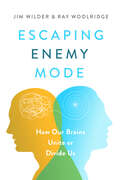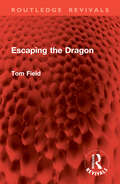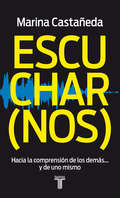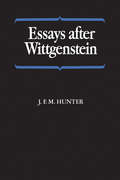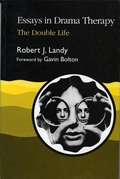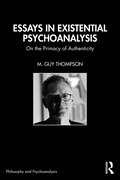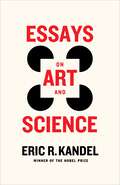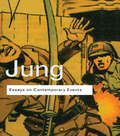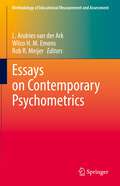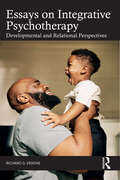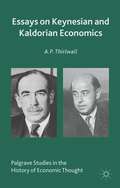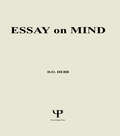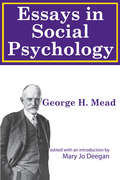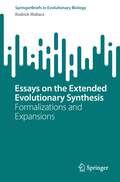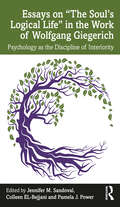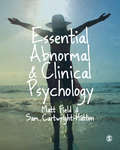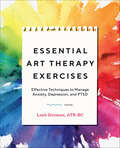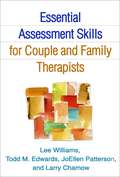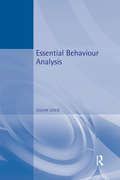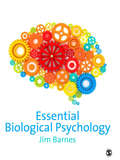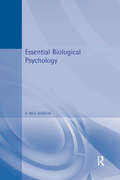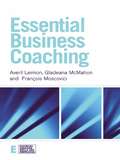- Table View
- List View
Escaping Enemy Mode: How Our Brains Unite or Divide Us
by E. James Wilder Ray WoolridgeWho&’s your biggest enemy? Possibly you? Enemy Mode is an immensely damaging brain state that occurs in everyday life. In enemy mode, a person sees and experiences others as adversaries. Living in this mode poisons family and community bonds. It contributes to social stress, business failure, divorce, alienation, domestic violence, crime, racism, and international violence. Social media magnifies the impact of enemy mode toward almost all topics or persons imaginable.Longtime author and neuropsychologist Dr. Jim Wilder explains how the brain develops enemy mode and searches for ways to get the brain to &“refriend.&” Since a brain in enemy mode cannot tell when someone is trying to help, it rejects or attacks its allies, including refrienders. Wilder puts his years of research to the test in assessing the impossible task put forth by the Christian faith: to love one&’s enemies. After being trained in enemy mode through the military, business, and even friendships, retired Brigadier General Ray Woolridge comes alongside Wilder, bringing the reader on his journey of learning to refriend. He interviews leaders in sports, business, the military, law enforcement, politics, health care, and education, assessing the enemy mode impact on lives and culture. Can Wilder and Woolridge figure out how enemy mode works and craft a solution? And can they get people and institutions to implement those solutions? This book is for all who desire to be better equipped to face the barrage of daily relational stressors that come at them. It&’s for all who long for more harmonious relationships at home, in the workplace, and in their communities.
Escaping From Predators
by Daniel T. Blumstein Cooper, William E. Jr. and Blumstein, Daniel T. William E. Cooper Jr.When a predator attacks, prey are faced with a series of 'if', 'when' and 'how' escape decisions – these critical questions are the foci of this book. Cooper and Blumstein bring together a balance of theory and empirical research to summarise over fifty years of scattered research and benchmark current thinking in the rapidly expanding literature on the behavioural ecology of escaping. The book consolidates current and new behaviour models with taxonomically divided empirical chapters that demonstrate the application of escape theory to different groups. The chapters integrate behaviour with physiology, genetics and evolution to lead the reader through the complex decisions faced by prey during a predator attack, examining how these decisions interact with life history and individual variation. The chapter on best practice field methodology and the ideas for future research presented throughout, ensure this volume is practical as well as informative.
Escaping the Dragon (Routledge Revivals)
by Tom FieldFirst published in 1985, Escaping the Dragon is written for anyone- parents, family, friends, teachers, health professionals- who want to know about heroin addiction. Based on the author’s own experience and research, this book details the misuse of heroin with emphasis on the recognition of physical and psychological addiction, the consequences and social effects, and most importantly the first steps, professional help and continuing support necessary to deal with heroin addiction.Escaping the Dragon is essential reading for anyone concerned about, interested in or actively combatting heroin addiction.
Escuchar(nos): Hacia la comprensión de los demás y de uno mismo
by Marina Castañeda¿En qué consiste escuchar a alguien? ¿Por qué, a lo largo de la historia, han existido grupos que "no merecen" ser escuchados y cuáles han sido las consecuencias para ellos? ¿Qué ha sucedido con el arte de la conversación? ¿Y con el silencio? Se dice que hay personas dotadas para la escucha, que nacieron con los dones de la empatía y la paciencia. Pero, ¿cómo consiguen estas personas eliminar los obstáculos, conscientes e inconscientes, individuales e interpersonales, sociales y culturales, que impiden que podamos escucharnos? Marina Castañeda analiza las dinámicas psicológicas profundas y, en su mayor parte, inconscientes, de la escucha, así como las relaciones de poder, las reglas de intercambio, los patrones culturales, y aspectos sociales y económicos que la rigen. Aborda el tema de la atención y explica cómo y por qué escuchamos lo que queremos. Recurre a la historia para mostrar por qué se está perdiendo esta vital facultad humana, y dar ejemplos de la escucha ideal; asimismo, expone las expectativas e ilusiones provocadas por la comunicación instantánea y el ciberespacio, así como los retos que plantea la globalización y la necesidad de inventar una nueva ética de la escucha. Además, gracias a su experiencia en este campo, la autora expone las características de la escucha en la psicoterapia, profesión que desde sus inicios ha estudiado el tema y desarrollado técnicas especializadas para lograr una escucha empática y respetuosa, al servicio del otro. Escuchar(nos) invita al lector a reflexionar sobre su capacidad de escuchar con una sección de preguntas y ofrece sugerencias para cultivar este arte y volver, nuevamente, el rostro hacia los demás.
Essays after Wittgenstein
by J.F.M. HunterWritten within the tradition of Wittgenstein's work, these eight original essays in philosophical psychology are either by-products of efforts to understand Wittgenstein's later writings or applications of techniques and approaches derived from Wittgenstein to problems about which he did not say a great deal. In much of his later writings, Wittgenstein was not so much trying to explain his own views as to tease, annoy, and confuse the reader into working our for himself solutions to some philosophical problems. Professor Hunter, goaded and guided by Wittgenstein, here presents in clear and plain prose the views that he has worked out on a number of different questions. Although the essays are not exegetical in form, they will be found by students of the great philosopher to contain a large number of novel suggestions as to how Wittgenstein might be interpreted; philosophers, psychologists, linguists, and mathematicians are offered an unconventional, interesting, and richly argued approach to some of the main problems in philosophical psychology. The essays treat Meaning, Telling, Pain, Logical Compulsion, Identity, Imagining, Dreaming, and Talking. One eminent scholar has predicted that this volume may reverse the present tendency of philosophers to follow the lead of Noam Chomsky in the philosophy of language.
Essays in Drama Therapy: The Double Life
by Robert J. LandyThe concept of 'double life' can be seen to be a central theme running through this collection of essays - encapsulating the drama-therapist's need to balance the issues of theory, practice and personal growth.
Essays in Existential Psychoanalysis: On the Primacy of Authenticity (Philosophy and Psychoanalysis)
by M. Guy ThompsonIn this brilliant and revolutionary collection of 14 major essays that draw from more than 25 years of painstaking research, M. Guy Thompson regales us with a stunning revisioning of conventional psychoanalysis that deepens our understanding of the human condition. Integrating the most seminal existentialist philosophers, including Nietzsche, Heidegger, and Sartre, with the most forward-thinking psychoanalysts over the past century, including Freud, Laing, Bion, Winnicott, and Lacan, Thompson offers a profound yet deeply personal vision of what psychoanalysis can be in the 21st century. In this fascinating volume, Thompson explores such concepts as experience, authenticity, will, happiness, and agency by utilizing a wide range of thinkers, including the ancient Greeks, but always in his singular voice. Exquisitely lucid and engaging to read, Thompson deftly lures us into thoughtful and enlightening territory typically inaccessible to the general reader. This compelling integration of continental philosophy and psychoanalysis will be of interest not only to psychoanalytic practitioners of all persuasions, but to psychotherapists generally and their patients, as well as philosophers, social scientists, and any student of the human condition.
Essays on Art and Science
by Eric R. KandelWhen we view a work of art, we often experience an emotional response, but the causes of our reactions are complex. Our knowledge of why we respond to art as we do is rooted in science—in psychology and biology. Eric R. Kandel traces the origins of this understanding to early twentieth-century Vienna, which gave rise to the concept of the “beholder’s share,” the realization that art is incomplete without the perceptual and emotional involvement of the viewer—that is, without our responses to it.But what causes our response? Our brain is a creativity machine that brings to bear on any image—including a painting—certain innate, universal processes related to sensory perception as well as higher-order processes related to our personal experiences, memories, and emotions. Understanding how these unconscious processes in the brain interact to create the beholder’s share is one of the great challenges currently confronting brain science.The essays on art and science in this book vary widely in subject matter, including the angst-ridden portraits of Soutine, conflicting views of women’s sexuality, Cubism’s challenge to our innate visual processes, and why we react differently to abstract versus figurative art. But each essay focuses on the interaction of art and science. Woven throughout are the many notable scientists, art historians, artists, and others, both Jewish and non-Jewish, who contributed to our understanding of how we experience art.
Essays on Contemporary Events (Routledge Classics)
by C. G. JungWas the leading psychologist of his time a Nazi sympathiser? This was the question asked by many after the Second World War, as they sought to explain Jung's actions and publications during Nazi rule. So great was the controversy that his reputation risked being permanently damaged. Essays on Contemporary Events was the first broadside in his vigorous defence of his beleaguered reputation. This remarkable work is essential reading for anyone seeking to understand Jung. It will enable the reader to decide: was Jung wholly innocent of the accusations or had he, like so many others, fallen under the Nazi spell and was now trying to make amends.
Essays on Contemporary Psychometrics (Methodology of Educational Measurement and Assessment)
by L. Andries van der Ark Wilco H. M. Emons Rob R. MeijerThis book 'Essays on Contemporary Psychometrics' provides an overview of contemporary psychometrics, the science devoted to the advancement of quantitative measurement practices in psychology, education and the social sciences. The volume consists of four parts, each having several chapters on cutting-edge work in the field. Part I, General Perspectives on Psychometrics, includes expert views on topics such as psychological models vs. measurement models, using tests in decision making, artificial intelligence, and psychometric network models. Part II, Factor Analysis and Classical Test Theory, the type of psychometrics that is still used most often in the social and behavioral sciences, includes state-of-the-art contributions on test-score reliability, change-score reliability, handling missing data in principal component analysis, test equating, and conditional standard errors of measurement. Part III, Item Response Theory, the leading form of psychometrics in modern educational measurement, includes discussions of sampling from many conditional distributions, transparent score reporting, nonparametric item response theory, and targeted testing. Part IV, New Psychometrics, discusses recently developed ideas beyond classical test theory and item response theory, including topics related to computer adaptive testing, response-time modelling, validity indices, diagnostic classification models, and the sparse latent class model for ordinal measurements.Together, these four parts provide an overview of the current state-of-the-art in psychometrics in educational measurement. They are a valuable source of information for graduate students who (intend to) study psychometrics and need an overview of the field, and for researchers interested in the current developments in the field. Chapters [3], [5], [8], [16] and [19] are available open access under a Creative Commons Attribution 4.0 International License via link.springer.com.
Essays on Economics and Economists
by R. H. CoaseHow do economists decide what questions to address and how to choose their theories? How do they tackle the problems of the economic system and give advice on public policy? With these broad questions, Nobel laureate R. H. Coase, widely recognized for his seminal work on transaction costs, reflects on some of the most fundamental concerns of economists over the past two centuries. In fifteen essays, Coase evaluates the contributions of a number of outstanding figures, including Adam Smith, Alfred Marshall, Arnold Plant, Duncan Black, and George Stigler, as well as economists at the London School of Economics in the 1930s. Ronald H. Coase was awarded the Nobel Prize in Economic Science in 1991.
Essays on Integrative Psychotherapy: Developmental and Relational Perspectives
by Richard G. ErskineThis book is a distinctive collection of essays on the theory and methods of a developmentally-based, relationally-focused integrative psychotherapy.In an easy-to-read style, Richard Erskine elaborates on a relationally-focused psychotherapy for acute and cumulative neglect, dissociation, alcoholism, obsession, prolonged grief, as well as psychotherapy with couples. Detailed examples of actual psychotherapy sessions illustrate the therapeutic methods of both phenomenological and developmental inquiry as well as the significance of the psychotherapist's interpersonal involvement through acknowledgment, validation, normalization, and presence. Each chapter takes the reader into further depths of understanding the complexities of an in-depth psychotherapy. Erskine writes from the heart while drawing from over fifty years as a psychotherapist, supervisor, and trainer.Essays on Integrative Psychotherapy vividly illustrates the interpsychic struggle of clients who engage in the schizoid process of relational withdrawal and live in loneliness, and will be essential reading for psychotherapists and psychoanalysts in practice and in training.
Essays on Keynesian and Kaldorian Economics
by A. P. ThirlwallThis volume of essays contains 16 papers the author has written over the last 40 years on various aspects of the life and work of John Maynard Keynes and Nicholas Kaldor. It covers both theoretical and applied topics and highlight the continued relevance of Keynesian and Kaldorian ideas for understanding the functioning of capitalist economies.
Essays on Mind
by Donald O. HebbDonald Olding Hebb, referred to by American Psychologist as one of "the 20th century's most eminent and influential theorists in the realm of brain function and behavior," contributes greatly to the understanding of mind and thought in Essays on Mind. His objective was to learn about thought which he considered "the central problem of psychology -- but also, not less important, to learn how to think clearly about thought, which is philosophy." The volume is written for advanced undergraduates, graduates, professionals, and lay people interested in or studying the mind. Hebb offers an increased understanding of the mind from a biological perspective that affects long-standing philosophical and psychological problems. "Psychology and Philosophy were divorced some time ago but, like other divorced couples, they still have problems in common," writes Hebb. The first three chapters establish the methodological and philosophical basis for his biologically centered theory of behavior, including the evolution of the mind, nature versus nurture, the origination and status of cell-assembly theory, and infant thought and language development. He concludes with a discussion of the workings of scientific thought from a practical rather than theoretical perspective.
Essays on Social Psychology
by George MeadGeorge Herbert Mead (1863-1931) is a central, founding figure of modern sociology, comparable to Karl Marx and Max Weber. Mead's early work, prior to his posthumous publications that appeared after 1932, is believed to be a series of articles contemporary scholarship defines as disconnected. A previously unknown, never published set of galleys for a book of essays by Mead, written between 1892 and 1910, unites these articles into a logical perspective. Essays on Social Psychology, Mead's "first" book, clearly locates him within a significantly different tradition and network than documented in his posthumous volumes. The discovery of this work is a major scholarly event. Instead of being abstract and unemotional, as some scholars argue, Mead's early scholarship focused on the significance of emotions, instincts, and childhood as well as political issues underlying political problems in Chicago. During these early years, he was involved with the emerging Laboratory Schools at the University of Chicago which was then the center of progressive education. These early topics, interpretations, and scholarly networks are dramatically different in these writings from those of Mead as a mature scholar. They demonstrate that he was clearly making a transition from psychology to social psychology at a time when the latter was in its infancy. Mary Jo Deegan, a world-renowned Meadian scholar, has comprehensively edited this volume, footnoting now obscure references and authors. Her introduction explains how this previously lost manuscript affects contemporary Meadian scholarship and how it reflects the city and times in which he lived. Unlike the posthumous volumes, assembled from lecture notes, Essays in Social Psychology is the only book actually written by Mead and challenges most current scholarship on him. The selections are highly readable, surprisingly timely yet historically significant. Psychologists, sociologists, and educators will find it immensely important. George Herbert Mead (1863-1931) taught at the University of Chicago from 1894 to 1931. His posthumous volumes are The Philosophy of the Present, Mind, Self, and Society, and The Philosophy of the Act. Mary Jo Deegan is professor of sociology at the University of Nebraska, Lincoln. She is the author of Jane Addams and the Men of the Chicago School, 1892-1918, named by Choice as among the outstanding academic books of 1989.
Essays on the Extended Evolutionary Synthesis: Formalizations and Expansions (SpringerBriefs in Evolutionary Biology)
by Rodrick WallaceFrom the ‘punctuated equilibrium' of Eldrege and Gould, through Lewontin's ‘triple helix' and the various visions and revisions of the Extended Evolutionary Synthesis (EES) of Laland and others, both data and theory have demanded an opening-up of the 1950's Evolutionary Synthesis that so firmly wedded evolutionary theory to the mathematics of gene frequency analysis. It can, however, be argued that a single deep and comprehensive mathematical theory may simply not be possible for the almost infinite varieties of evolutionary process active at and across the full range of scales of biological, social, institutional, and cultural phenomena. Indeed, the case history of 'meme theory' should have raised a red flag that narrow gene-centered models of evolutionary process may indeed have serious limitations. What is attempted here is less grand, but still broader than a gene-centered analysis. Following the instruction of Maturana and Varela that all living systems are cognitive, in a certain sense, and that living as a process is a process of cognition, the asymptotic limit theorems of information and control theories that bound all cognition provide a basis for constructing an only modestly deep but wider-ranging series of probability models that might be converted into useful statistical tools for the analysis of observational and experimental data related to evolutionary process. The line of argument in this series of interrelated essays proves to be surprisingly direct.
Essays on “The Soul’s Logical Life” in the Work of Wolfgang Giegerich: Psychology as the Discipline of Interiority
by Jennifer M. Sandoval Colleen El-Bejjani Pamela J. PowerEssays on "The Soul’s Logical Life" in the Work of Wolfgang Giegerich: Psychology as the Discipline of Interiority is the second collection of essays dedicated to the study and application of psychology as the discipline of interiority–a new ‘wave’ within analytical psychology which pushes off from the work of C. G. Jung and James Hillman. Reflecting upon the notion of psychology developed by German psychoanalyst Wolfgang Giegerich, whose Hegelian turn sheds light on the notion of soul, or the objective psyche, and its inner logic and ‘thought’, forms a radical new basis from which to ground a modern psychology with soul. The book explores the theme of "the soul’s logical life" as it displays itself in various modern phenomena, from overwhelming anxiety, cryptocurrency, the dreams of Japanese college students, and contemporary psychoanalysis, to myth, music, social movements, and the question and relevance of truth in psychology and consciousness. The authors, comprising clinical psychologists, teachers, Jungian analysts, and international scholars, aim to reveal and convey the dialectical inner workings and speculative logic of the modern soul. Essays on "The Soul’s Logical Life" in the Work of Wolfgang Giegerich: Psychology as the Discipline of Interiority will be essential reading for depth and clinical psychologists, Jungian psychoanalysts, and academics and students of post-Jungian studies, and for all those interested in what it means to think in the highly sophisticated and technological world of the twenty-first century.
Essential Abnormal and Clinical Psychology
by Sam Cartwright-Hatton Dr Matt FieldInstructors - Electronic Inspection Copies are available or contact your local sales representative for an Inspection Copy of the print version. This essential introduction to abnormal and clinical psychology explores the key areas, controversies and debates in the field and encourages students to think critically. Key features of this textbook include: The latest updates from DSM-5 and ICD-10 and a balanced critique of the diagnostic approach, keeping students at the forefront of the developments and debates in the field "Essential Debate" and "Essential Experience" boxes that encourage critical thinking and provide case study examples to help students critique the findings and apply them in practice Concise chapters providing students with the essentials they need to get a good grade in their module in Abnormal and Clinical Psychology Additional student resources available on the companion website (https://study.sagepub.com/fieldcartwrighthatton). Suitable for all students taking Abnormal and Clinical Psychology modules.
Essential Abnormal and Clinical Psychology
by Sam Cartwright-Hatton Dr Matt FieldInstructors - Electronic inspection copies are available or contact your local sales representative for an inspection copy of the print version. This essential introduction to abnormal and clinical psychology explores the key areas, controversies and debates in the field and encourages students to think critically. Key features of this textbook include: The latest updates from DSM-5 and ICD-10 and a balanced critique of the diagnostic approach, keeping students at the forefront of the developments and debates in the field 'Essential Debate' and 'Essential Experience' boxes that encourage critical thinking and provide case study examples to help students critique the findings and apply them in practice. Concise chapters providing students with the essentials they need to get a good grade in their module in Abnormal and Clinical Psychology. Additional student resources available on the companion website https://study.sagepub.com/fieldcartwrighthatton) Suitable for all students taking Abnormal and Clinical Psychology modules. Suitable for all students taking Abnormal and Clinical Psychology modules
Essential Art Therapy Exercises: Effective Techniques to Manage Anxiety, Depression, and PTSD
by Leah GuzmanDiscover the healing power of art therapyThe purposeful act of making art can be more than a creative outlet. It can also help individuals gain self-awareness, process difficult thoughts, and even ease the effects of past traumas. Essential Art Therapy Exercises, a cognitive behavioral therapy workbook, offers a range of creative activities to help you better understand yourself, develop control over your emotions, and aid the healing process.This well-reviewed art therapy workbook includes:Exercises for healing and self-discovery—75 strategic art therapy activities offer new opportunities for self-expression and tools for coping with mood and personality disorders.Supportive prompts and interactions—Each exercise includes an explanation of its purpose and potential outcomes along with a series of insightful post-activity questions.Judgment-free guidance—Learn the basics of different artistic techniques and mediums, like drawing, painting, and sculpting—no previous art experience necessary.Helpful supply lists and tips—Includes a complete list of the art supplies you'll need for each art therapy project and advice on creating your own healing space.Find new peace and positivity with Essential Art Therapy Exercises.
Essential Assessment Skills for Couple and Family Therapists
by Lee Williams Todd EdwardsShowing how to weave assessment into all phases of therapy, this indispensable text and practitioner guide is reader friendly, straightforward, and practical. Specific strategies are provided for evaluating a wide range of clinical issues and concerns in adults, children and adolescents, families, and couples. The authors demonstrate ways to use interviewing and other techniques to understand both individual and relationship functioning, develop sound treatment plans, and monitor progress. Handy mnemonics help beginning family therapists remember what to include in assessments, and numerous case examples illustrate what the assessment principles look like in action with diverse clients.
Essential Behaviour Analysis (Essential Psychology)
by Julian LeslieSince the so-called 'cognitive revolution' in psychology in the 1960s, it has often been said that 'behaviourism is dead'. This book demonstrates why this is not the case and how the behavioural approach has continued to flourish.Leslie begins by summarising the behavioural approach to psychology and shows how it differs from other contemporary and cognitive approaches. The basic principles of the discipline are outlined and linked to major areas of interest and importance, such as behavioural neuroscience, resolution of human behavioural problems, and human language and cognition.Behaviour analysis is thus shown to contribute to our developing understanding of the relationship between brain systems and psychological problems, to provide an effective and scientifically based approach to human behavioural problems and to deal with topics central to modern psychology.
Essential Biological Psychology
by Jim BarnesDrawing on the latest exciting research, Essential Biological Psychology provides students with a solid grasp of the relationship between mind and behaviour, and a detailed understanding of the underlying structure and physiological mechanisms that underpin it. The functions of the nervous system are explained and implications for health are explored. Throughout the book, Jim Barnes encourages students to evaluate essential concepts and theoretical issues. <P><P> Features include:<P> * key concepts highlighted throughout the text enables students to grasp the fundamental knowledge and understanding of the structures and functions of the human nervous system that are relevant to the study of psychology <P> * the snapshot of key studies detailed in the textboxes allow critical evaluation of the role of physiology in human behaviour against a backdrop of up to date research <P> * clear explanations of the key methods in the text give students an appreciation of the contributions made by the different approaches and research methods that are used in biological psychology <P> * memory maps and diagrams within the text encourage learning and allow students to formulate memory aids to assist recall in exam conditions <P> * a companion website found at www.sagepub.co.uk/barnes consists of PowerPoint lecture slides and a testbank for teachers (50 questions per chapter) as well as interactive self-assessment testbank for students (10 questions per chapter)
Essential Biological Psychology (Essential Psychology)
by G Neil MartinThe Essential Psychology Series bridges the gap between simple introductory texts aimed at pre-university students and higher level textbooks for upper level undergraduates. Each volume in the series is designed to provide concise yet up-to-date descriptions of the major areas of psychology for first year undergraduates or students taking psychology as a supplement to other courses of study. The authors, who are acknowledged experts in their field, explain the basics carefully and engagingly without the over-simplification often found in introductory textbooks, at the same time providing the reader with insights into current thinking.Essential Biological Psychology is an accessible, well-illustrated and well-written account of the study of the role of the body in behaviour and the effect of behaviour on the working of the body. Covering all the major topics within biopsychology, and evaluating the most up-to-date findings, particularly within neuroscience and neuroimaging research, this textbook is essential reading for first and second level undergraduates taking courses in biological or physiological psychology as well as anyone studying courses in neuropsychology or behavioural neuroscience.
Essential Business Coaching: How To Run A Highly Successful Coaching Business (Essential Coaching Skills and Knowledge)
by Averil Leimon Gladeana McMahon Francois MoscoviciDo coaches need to be psychologists, business people or both? Essential Business Coaching offers a much-needed answer to the question of what makes a good business coach. The authors draw on 60 years of combined experience to provide an in-depth review of best practice and theory. They provide a thorough examination of the changing nature of work, the need for new sources of competitive advantage and the benefits of investing in coaching. Useful ideas for further reading are found throughout, along with numerous examples of real business coaching situations. The inclusion of interviews with both corporate sponsors and individual clients provide a unique insight into what makes good coaching in practice. The combination of solid theory and abundant examples make Essential Business Coaching an invaluable tool for all business coaches as well as counsellors, psychotherapists, human resource professionals and senior managers.
